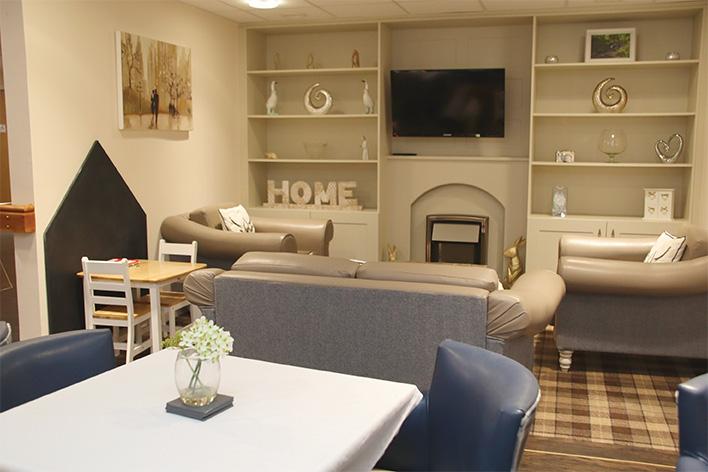Why Personalised Care is Important for People with Dementia

Dementia is a progressive condition that affects memory, problem-solving, communication skills, and the ability to carry out daily tasks. As time progresses, people with dementia often need more and more support from family members and care professionals to maintain their quality of life.
Making the move into a care home can be overwhelming for both the person with dementia and their family. However, a personalised dementia care plan can help make the transition as as smooth as possible because it fits their specific needs even as the disease progresses. A good care home ensures that all care is tailored to the individual rather than a one-size-fits-all approach—a fully personalised care plan considers the person’s medical treatment, their preferences, and abilities.
Creating a Personalised Care Plan
A tailored care plan is fundamental in dementia care because it recognises the inherent uniqueness of each person living with the condition. Dementia affects everyone differently, and as a result, a one-size-fits-all approach simply isn't effective. By creating a personalised care plan, caregivers can ensure that care reflects the individual's personal history, preferences, and specific needs.
The aim is to treat the whole person, not just their symptoms. This approach contrasts sharply with the traditional medical model, which often prioritises the treatment of symptoms over the emotional and cognitive well-being of the individual. Instead, person-centred care shifts the focus toward understanding and respecting the person’s lived experience, building a compassionate care plan that is tailored to their unique journey with dementia.



Focusing on the Individual
At the core of a personalised dementia care plan is the philosophy of person-centred care. It's about treating people as individuals first and foremost, recognising their personal histories, interests, and values. Unlike traditional medical models that focus narrowly on treating the symptoms of dementia, person-centred care understands that people are more than just a set of medical conditions.
People with dementia have emotional, social, and psychological needs that must also be addressed. This care model seeks to empower individuals by giving them a voice in their care process, ensuring their preferences are heard and respected. Whether it's their favourite music, preferred daily routine, or even a cherished hobby, these elements are incorporated into their care to promote dignity, comfort, and joy.
Personalised Activities for Cognitive and Emotional Well-Being
One of the key components of a personalised dementia care plan is the inclusion of activities that resonate with the person’s individual interests. Such activities are not chosen arbitrarily; they are designed to engage the resident in ways that are meaningful and beneficial. Activities like puzzles, music therapy, art, or light physical exercises can have profound effects on cognitive stimulation and emotional well-being. These engagements not only bring enjoyment but also help maintain cognitive functions for as long as possible.
Beyond cognitive benefits, these activities can be particularly helpful in fostering emotional connection and positive social interactions. For example, group activities that involve reminiscence therapy allow residents to recall memories from their past in a safe and supportive environment, which can spark conversations and feelings of connectedness. This aspect is especially important because dementia often leads to feelings of isolation and frustration. Engaging activities give carers the opportunity to provide emotional support, which in turn can alleviate some of these negative emotions.
Supporting Social Interaction and Cognitive Stimulation Through Tailored Care Plans
Dementia care is not solely about managing cognitive decline; it also involves nurturing emotional well-being and fostering social connections. A personalised care plan often includes structured opportunities for social interaction, which is a vital aspect of maintaining a sense of identity and community. Social activities like group games, shared meals, or even organised trips to familiar places can significantly enhance the quality of life for those with dementia. In these settings, residents can connect with others, share experiences, and engage in conversations that help combat feelings of isolation.
Cognitive stimulation is equally important in dementia care. Activities that challenge the brain, such as memory games or problem-solving tasks, are included in a personalised care plan to help maintain cognitive function. These activities are often selected based on the individual's interests and abilities, ensuring that the challenges are both stimulating and achievable. This tailored approach prevents frustration and promotes a sense of accomplishment, reinforcing the person’s self-worth.
Reminiscence Therapy
A vital aspect of many personalised dementia care plans is reminiscence therapy, which plays a crucial role in connecting individuals with their past. Reminiscence therapy involves discussing past experiences, often prompted by familiar objects, photos, music, or scents. These stimuli can evoke memories that are emotionally significant and help those with dementia reconnect with their identities. Sharing these memories can be a source of comfort and joy, as well as an opportunity to build deeper relationships with caregivers and fellow residents.
Through reminiscence therapy, individuals with dementia are encouraged to engage in conversations about their lives, which can reinforce their sense of self. It also provides caregivers with insights into the person’s history, helping them to better understand their needs and preferences. This form of therapy has been shown to reduce agitation, improve mood, and increase overall well-being.
Enhancing Communication and Building Relationships
Good communication is a key component of any care plan, but it is especially important in dementia care. As dementia progresses, people can often experience difficulties in expressing themselves. A personalised care plan can incorporate the ways the resident best communicates with others to ensure any caregiver can provide dementia care in the best possible way. By focusing on the person’s experience and communication skills, care professionals can build relationships based on trust, empathy, and understanding.
Person-centred care planning encourages active involvement from the individual and their family, ensuring that their preferences and best interests are at the forefront of decision-making. This approach fosters positive emotions and creates a sense of empowerment for the person with dementia, as they feel involved in their own health and well-being.



Supporting Mental Health and Emotional Well-Being
Mental health is a critical aspect of care planning for people with dementia. A personalised care plan helps to address not only the person’s cognitive and physical health but also their psychological symptoms. This holistic approach is essential for improving well-being, as it acknowledges the emotional needs of the person with dementia which in hand can help to improve communication between residents and care professionals.
Adaptability of Care Provided
A personalised care plan is not a static document; it is an ongoing process that requires regular review and updates as the person’s condition or needs progress. Dementia is a dynamic condition, and a care plan must evolve to accommodate changes in the person’s cognitive abilities, medical treatment, and emotional needs. A person-centred care plan ensures that the residents' experience of care remains positive and that they receive the right support at the right time.
Collaboration Between Care Professionals and Family Members
Creating a personalised care plan for people with dementia requires a collaborative effort between care professionals and family members to create a detailed description of the person’s needs, preferences, and best interests.
Primary care professionals, such as doctors, nurses, and social workers also play a key role in developing and implementing the care plan. They will conduct needs assessments, monitor the person’s health, and provide guidance on medical treatment and care practices. Family members, on the other hand, offer valuable insights into the person’s life, history, and preferences, which are essential for creating a person-centred approach to care.
Key Components of a Personalised Dementia Care Plan
- Detailed Information on Health Conditions
A thorough understanding of the person’s health conditions, including their dementia diagnosis and any other previous or ongoing medical issues, is essential for developing an effective care plan. This ensures that all aspects of the person’s health are addressed, including their physical, emotional, and psychological needs.
- Cognitive Stimulation and Meaningful Activities
Activities tailored to the person’s cognitive abilities and interests are key to promoting engagement and maintaining their quality of life. Cognitive stimulation, reminiscence therapy, and social interaction are all important aspects of dementia care that help to improve mental health and reduce psychological symptoms.
- Personal Goals
It is important for residents to have something to work towards whilst receiving dementia care. Developing personal goals makes a good baseline to refer back to regularly and makes it easy to see the progress a resident has made during their care journey and alter if their needs or preferences change. It can also be used for planning activities as incorporating goals into their daily life can provide residents with a sense of achievement.
- Intervention Points
Sometimes, medical intervention is needed from a care professional. Identifying this in the care plan ensures the right person gets involved at the most appropriate time. Having the process set out as a precaution can also create the perfect environment for residents to easily recover.
Dementia Care at Springvale Care Home
At Springvale Care Home in Lennoxtown, we pride ourselves on providing person-centred care tailored to the unique needs of every resident. Our experienced team works hand-in-hand with residents, their loved ones, and healthcare professionals to create and adapt care plans that ensure the best possible support.
To further enhance our residents’ daily lives, we offer a wonderful selection of facilities, including tranquil courtyard gardens, a hair salon and nail bar, and a welcoming café that are fully accessible to our residents with dementia.
If you’d like to find out more about the care we provide, our tailored support plans, or any other details about life at Springvale Care Home, please feel free to reach out to our friendly team or book a visit. We’d love the chance to show you what makes Springvale so special!






